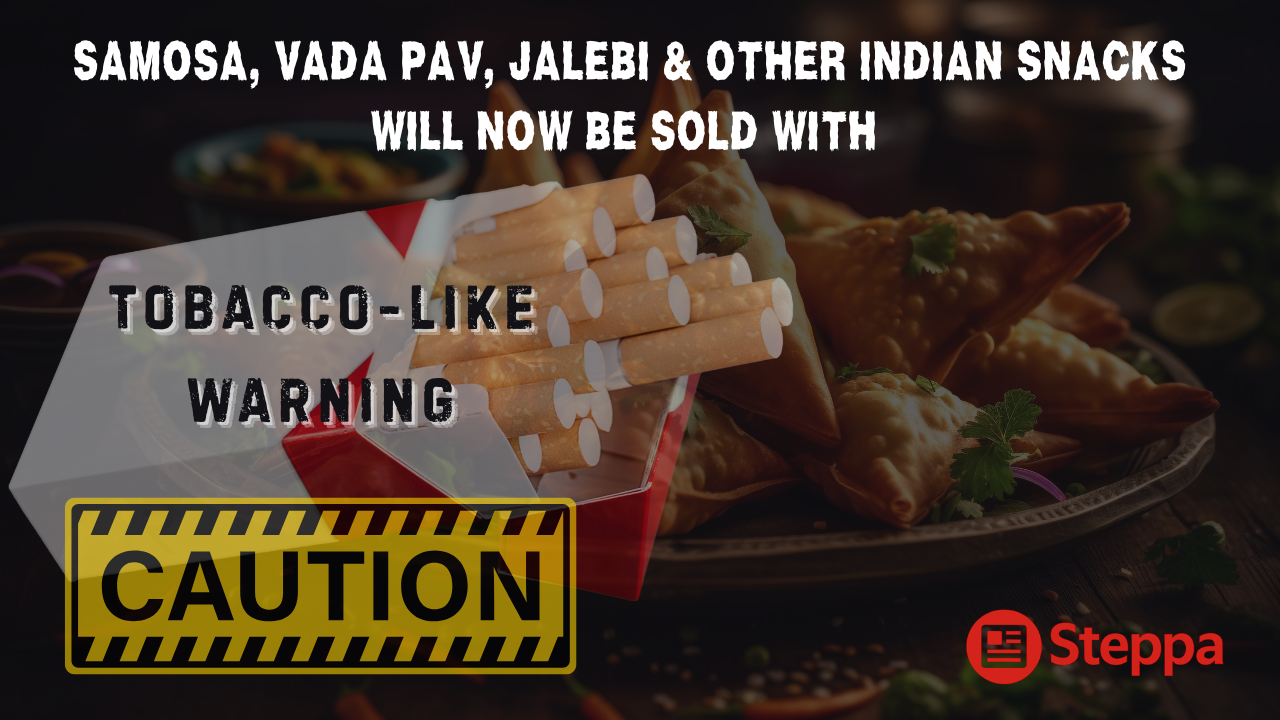Let’s be real—your next jalebi or vada pav just might come with a side of guilt. No joke.
India Slaps Warning Labels on Samosas, Jalebis & Vada Pav — Just Like Cigarettes yes India’s Health Ministry is rolling out cigarette-style warning boards (called “oil & sugar boards”) in places like AIIMS Nagpur, and soon other central government cafeterias, to display hidden fats, sugars, and calories in your favorite snacks. This pilot is meant to shake you up before you take that first bite.
—source statements from India Today and Economic Times(Moneycontrol, The Economic Times, India Today)
Warning Labels on Samosas So What’s the Story Here?
To be fair, this isn’t a ban. Instead, we’re talking bright, bold posters near food counters, with nutrition details like:
- Calories per serving
- Oil/fat level
- Sugar and trans-fats
They’re designed to mimic cigarette warnings—to shock you into reading before you chow down.
“Sugar and trans fats are the new tobacco. People deserve to know what they’re eating.”
— Dr Amar Amale, Cardiological Society of India (Nagpur)(India Today, Moneycontrol)
“If people knew one gulab jamun has five teaspoons of sugar, they’d think twice.”
— Dr Sunil Gupta, senior diabetologist(Moneycontrol)
Warning Labels, Why Now?
Obesity and lifestyle diseases are on a fast track in our country.
- By 2050, a projected 449 million Indians will be overweight or obese—second only to the U.S.(India Today)
- Right now, 1 in 5 urban adults is already overweight
- Childhood obesity is climbing thanks to unhealthy food habits and less movement(The Economic Times, Moneycontrol)
That’s why this ties into PM Modi’s Fit India campaign, aiming to reduce national oil use by 10%.
Real Talk from Food Experts
This move is stirring mixed reactions, but doctors are nodding along:
- Dr Rajiv Kovil, diabetology head, says these high-fat snacks can trigger not just diabetes and heart disease—but even fatty liver, gut issues, hormonal problems, and immunity dips(The Economic Times, The Financial Express, Indiatimes)
- Dr Bhanu Mishra from ICMR/NIN warns ultra-processed food is a major public health risk(Instagram)
Meanwhile, some critics feel it smacks of cultural insensitivity. But health experts say it’s a wake-up call—not an attack on tradition(Indiatimes)
What to Expect (and When)
- Pilot begins in AIIMS Nagpur cafeterias
- Expect rollout across more government-run institutions
- Posters will focus on common guilty pleasures—samosa, pakora, jalebi, laddoo, vada pav
Warning Labels Like Cigarettes, Will It Work?
Honestly? It’s hard to say. Some might ignore it, thinking “meh, I know it’s fried.” But others might pause and think: “Am I making another unhealthy choice?”
Even raising awareness is a win. If just one person skips that extra jalebi because of a poster—maybe that’s progress.
Summary Table
| Before | After |
| Guilt-free snacking | Questioning your choices |
| Habitual munching | Reading nutritional warnings quietly |
| Nostalgic indulgence | Thinking twice before that second bite |
FAQs You Might Have
- Are they banning samosas or jalebis?
Nope! They’re just posting info—no restrictions. - Only deep-fried snacks covered?
Junk food across the board—biscuits, sweets, tea-time fluff—it’s all in scope. - Will this reach private eateries?
For now it’s only central govt institutes; Delhi Metro or your local dukan? Not yet. - Does it apply to packaged snacks too?
Not yet, but this could signal tougher food labelling ahead. - When will more places get the boards?
After AIIMS Nagpur’s launch, expect other institutions to follow—likely in the coming months. - Does Fit India back this?
Totally—this ties right into that broader push for healthier lifestyles. - Any cultural backlash?
Some think it’s targeting traditions. Others say it’s a timely step amid a health crisis. - Do countries abroad do this?
Similar warning systems exist for sodas and sugary foods in places like Chile—but food culture is sensitive in India. - Will unhealthy snack prices go up?
Probably not—the cost won’t change, but your perception might.
